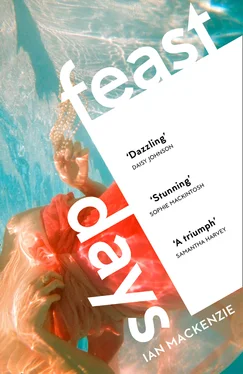I was able to track my husband’s phone over the Internet. There it was: a dot on the map, in a far northern zone of the city, impoverished and intimidating. I showed my husband. “Whoever that is, it’s not those kids,” he said. “And I already filed the insurance claim.” I zoomed in, and the digital map approached the limit of its resolution. The dot—an exact, real-time location, complete with geocoordinates—seemed like a promise, but I had the feeling that if I were to physically move toward it, it would simply move away from me.
We told our Brazilian friends about the robbery. Everyone cooed with sympathy and recognition: it was as if we had passed some test of admission. “They normally rob you with guns in São Paulo,” Marcos said. “Rio is knives,” Iara said. We laughed. They had stories of their own. Crime was a source of anxiety among the upper classes in São Paulo. Until you became so rich that you literally flew everywhere by helicopter.
At dinner, a conversation about money. Brazil’s economy, the mess it was in. Everything had gone so well for so long—and now the forecast was disaster. Our friends blamed the president, the party. Marcos worked with my husband and was married to Iara, and they knew João from somewhere. It was difficult to become friends with Brazilians—someone would suggest a time and not a place or a place and not a time—but after several months we were somehow still going to dinner with these people. They never laughed when they talked about politics.
Food appeared in portions so small they looked decorative, zoned on white plates, squares of black slate. Each plate-thing was accompanied by a lecture from the waiter: the per-dish speaking time was almost equal to the per-dish eating time. This was the tasting, the degustação. I didn’t make an effort to understand when the waiter talked; I wanted to know as little as possible about what I was putting in my mouth, to be totally unprepared. I wanted no context. In some cases, I couldn’t tell what the ingredients were, even after chewing and swallowing. Degust and disgust have the same root— gustare , to taste—but opposite meanings. Ignorance : that’s the word for what I wanted.
Dinner with Brazilians—the first courses arrived at the table after nine o’clock. We ate alien forms from the sea, Galician octopus, slate-pencil urchins, a funny-looking gratin of salt cod. This chef was famous, too, a woman. Late in the evening, she emerged from the kitchen, observed by the diners, admired, radiating gentle authority. She was young, roughly my age. People went to her, and she received her guests like an ambassador, calm and generous. We ate suckling pig. We ate pastes and jellies and cold soups made from native Brazilian fruits. I couldn’t disguise my dislike of certain things. My husband talked about every dish as if he were making notes for a review. Since moving to São Paulo, he had become one of those gastro-creeps. Food, as a subject for conversation, was for me on par with pornography. I wished that for him food were more like pornography: something to be enjoyed privately and not discussed as if it were art. I’m sure there is such a thing as better pornography and worse pornography, but you aren’t supposed to go on about it.
And we ordered the wine pairings, of course. My husband insisted on this, as if in life one thing were always destined to be paired with another. I had as little interest in talking about the wine as I had in talking about the food, but I enjoyed drinking it. The waiters were happy to top off the glass of whatever they had just poured and I had just finished, gratis. “I’m having the wine pairing with the wine pairing,” I said.
João was talking about soccer and asked my husband something about the rules of American football. My husband was in love with speaking Portuguese. I followed the conversation with more success than I participated in it, and I wondered if this made our Brazilian friends think of me as someone who was quiet, who let her husband do the talking. We draw our power from language. You aren’t yourself in a foreign tongue. I can see why some people find this liberating.
I preferred to learn Portuguese by reading the newspapers. In the written language I could decode a number of words from their similarity to French. Live conversation was altogether different; I often found myself plunging into a state of zombielike incomprehension. Learning a language is a nonlinear affair. A moment of triumph often follows a crisis of confidence. Or else, after days of utter mastery, as your brain processes the language without that laborious sensation of actually processing it, you might find yourself suddenly suffering from language panic, total verb collapse, making errors of conjugation like someone blindfolded striking at tennis balls. You reach for a preposition from the shelf in your mind and find nothing there, absolutely nothing, no language whatsoever.
There had been a news event that day. Members of a homeless-rights group were occupying an unused building owned by a telecom giant. In Portuguese, the occupation was called an “invasion.” Police blasted the occupiers out with water cannons; there were injuries. João was the one who mentioned it. He disapproved, but at first I misunderstood the source of his disapproval—the actions not of the police but of the homeless-rights group.
Marcos concurred: The government tolerates these people, he said. They let them do this business. Eventually they use the police, but for political reasons they don’t arrest anyone after it is over. It is illegal what these people do. It is a kind of theft to use a building that doesn’t belong to you. In the world, there is legal and illegal, there is not some third thing.
Iara spoke, his wife. “The only time a Brazilian will wait at a red light is when there is a camera,” she said. She spoke in English; she wanted me to appreciate her point. “In America, even in the middle of the night, you wait at the red lights. Marcos never waits at the red lights.”
Iara, I had loved her at once, she had a taste for irony. Her life had a vague glamour. She knew artists. She seemed to belong professionally to the gallery circuit of São Paulo without, as far as I could tell, actually making any money at it. That was the sort of thing that impressed me.
I heard tales of killings in our neighborhood. A kid who was closing up a café at the end of the night, shot by a robber. Three guys, connected guys, executed as they left a nondescript restaurant where they went for whiskey and cigars once a week; maybe a gambling debt. This happened just up the street. One of the doormen told me the next day as I was coming back to the apartment. The killers shot only the men they were trying to shoot, men they had reason to kill; they even warned off a waiter before opening fire. This information, when the doorman offered it, was intended to reassure me.
I spent a lot of time inside the apartment. I didn’t have much of a choice. Even if I’d spoken Portuguese well enough, and even if there had been something for me to do, professionally, I didn’t have the right kind of visa. I was a double major, cultural anthropology and dead languages. I was a net loss, in the idiom of my husband’s industry. Or maybe I was a write-off. Housewife—I couldn’t bring myself to use the word. Nor could my husband, I noticed. There really wasn’t anywhere pleasant to walk.
“If I’d had a gun, I would have shot him in the head.”
This was late, he couldn’t sleep.
“You’ve never fired a gun in your life. You make fun of gun nuts.”
“He was holding a knife in your face. I wish I’d had the power at that moment to kill him.”
“No, you don’t. Then you would have killed someone.”
Читать дальше












